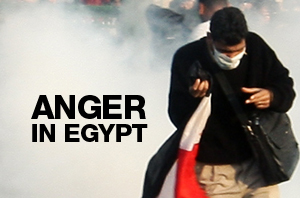Egypt braces for protest showdown
Government blocks internet and mobile services ahead of planned protests against President Mubarak’s 30-year rule.

 |
| Despite the security crackdown, protesters continue to vent their anger on the streets [AFP] |
Egypt is on edge as activists pressing for a change in government prepare to stage the biggest day of protests in the Middle East’s most populous nation amid a security clampdown.
Security forces are on high alert and internet, mobile phone and SMS services have been blocked ahead of the planned demonstrations following Friday prayers.
Al Jazeera’s Adam Makary, reporting from the port city of Alexandria, said communications had been badly hit in the wake of the shutdowns. “Internet is down and mobile phones are working only intermittently,” he said.
Dan Nolan, Al Jazeera’s correspondent in the capital, Cairo, said the government had effectively wiped the country off the global digital map in a bid to prevent protesters from organising themselves.
But he said people already know where to be on Friday if they want to have their voice heard “because an email was spread throughout Egyptian networks last night … that listed the places where people should gather”.
For the past three days, cities across Egypt have witnessed unprecedented protests against the 30-year rule of Hosni Mubarak, the president.
Apparently inspired by the recent turmoil in Tunisia, the determined protesters have stood their ground against heavily-armed police and are refusing to relent until there is a change in government.
The violence has so far left seven people dead.
Friday protests
A page on Facebook social networking site listed more than 30 mosques and churches where protesters were expected to gather on Friday.
|
“Egypt’s Muslims and Christians will go out to fight against corruption, unemployment and oppression and absence of freedom,” the page with more than 70,000 signatories said.
Basem Fathy Mohamed, a freelance journalist in Egypt, told Al Jazeera he expected one million people to participate in the protests.
The Associated Press news agency reported that an elite special counterterrorism force had been deployed at strategic points around Cairo as Egypt’s interior ministry warned of “decisive measures”.
Safwat Sherif, the secretary-general of the ruling National Democratic Party, told reporters on Thursday: “We hope that tomorrow’s Friday prayers and its rituals happen in a quiet way that upholds the value of such rituals …and that no one jeopardises the safety of citizens or subjects them to something they do not want.”
Meanwhile, a lawyer for the opposition Muslim Brotherhood said that 20 members of the officially banned group had been detained overnight.
Abdel-Moniem Abdel-Maksoud said two of the most senior members detained were Essam El-Erian, Brotherhood’s main spokesman, and Mohammed Moursi, a prominent Brotherhood leader.
‘Popular calls’
El-Erian had earlier warned the Mubarak government of the consequences of a breakdown of the situation “if the government continued to turn a deaf ear to popular calls”.
“The protest rallies will not stop while Friday will be another ‘day of wrath’,” he said.
The Muslim Brotherhood had avoided the protests in previous days, but late on Thursday it announced that its members would take part after Friday prayers.
Mohamed ElBaradei, the former head of the UN nuclear watchdog turned democracy advocate, also announced that he would join the demonstrators after returning from the Austrian city of Vienna, where he lives.
“It is a critical time in the life of Egypt. I have come to participate with the Egyptian people,” ElBaradei said as he left Cairo airport, where he was greeted by a small group of supporters.
“The desire for change must be respected. The regime must not use violence in the demonstrations.”
Earlier, ElBaradei, a Nobel peace laureate, said he was ready to “lead the transition” in Egypt if asked.
Before internet services were disrupted, social networking sites were abuzz with talk that Friday’s planned anti-government rallies could be some of the biggest so far calling for the overthrow of the 82-year-old president.
Millions of people gather at mosques across Cairo for Friday prayers, providing organisers with a huge number of people already out on the streets to tap into.
But on Friday, the Italy-based Seabone internet provider said there was no internet traffic going into or out of the country after 12:30 am local time on Friday.
Fierce clashes
Despite the security crackdown, protesters continue to vent their anger on the streets.
Protesters hurled Molotov cocktails at a fire station in the city of Suez, setting it ablaze on Thursday. At another rally near Giza on the outskirts of Cairo, police used tear gas to break up hundreds of protesters late at night.
Cairo, normally vibrant on a Thursday night ahead of the weekend, was largely deserted, with shops and restaurants shut. In Ismailia, hundreds of protesters clashed with police who used tear gas and batons to disperse them.
“This is a revolution,” one 16-year-old protester said in Suez . “Every day we’re coming back here.”
“The intensity continues to increase,” Al Jazeera’s Jamal Elshayyal reported from Suez.
“There have been fierce clashes with rubber-coated steel bullets being fired by the riot police as well as tear gas.”
Human Rights Watch said Egyptian police had escalated the use of force against largely peaceful demonstrations, calling it “wholly unacceptable and disproportionate”.
Barack Obama, the US president, urged both the government and protesters to show restraint as they expressed their “pent-up frustrations”.
“It is very important that people have mechanisms in order to express legitimate grievances,” he said as he answered questions from an online audience on the YouTube website.
Obama also urged Mubarak to make changes to the political system to appease the angry protesters.
“I’ve always said to him that making sure that they are moving forward on reform – political reform, economic reform – is absolutely critical for the long-term well-being of Egypt.”
